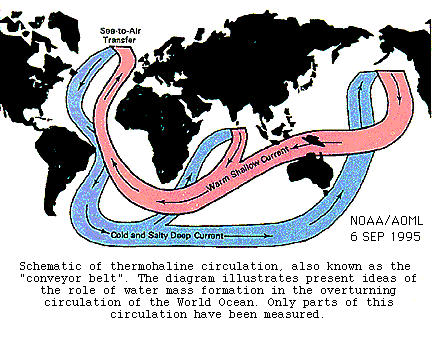
| MadSci Network: Earth Sciences |
Hi Eivind-
That's a good question, and one that a lot of oceanographers have considered! It's also a very vast subject area, but I'll try and give you a sense of what could happen:
Water circulates through the world ocean in a process called
thermohaline circulation. I've included a cartoon of it
below: 
Basically, at the poles (specifically the Labrador and Norwegian Seas, and around Antarctica), seawater is cooled by the atmosphere and sinks- this cold "bottom water" circulates along the bottom, all the way to the Pacific and Indian Oceans, where it mixes with warmer surface waters, and makes its way back to the poles. On the way to the poles, some water is lost to the atmosphere through evaporation, which makes that warm returning water more salty. The cold bottom water gets there through a process known as convective mixing, which is where water at the surface is cooled, which makes it more dense and allows it to sink downward. This is helped by the fact that the water is already pretty salty, and fairly dense. Click Here for more on deep convection and deep water formation in the Labrador Sea.
The movement of large amounts of salt and heat has some pretty important consequences for global climate. For instance, in the Atlantic, the thermohaline circulation is responsible for transporting about a billion megawatts of heat (that's equivalent to the output of about a million powerplants!) from the Gulf of Mexico to the North Atlantic.
Now, consider what will happen if there's suddenly a whole lot of extra freshwater added to the oceans, by the melting of polar icecaps due to global warming- suddenly the water at the surface will be less salty, which means it will be less dense, which means it will be that much harder for it to be mixed down and form deep water. Of course, if there's no deep water being formed, the thermohaline circulation will shut down. This will drastically change the way that heat is moved throughout the world and will change ocean temperatures in many ways, and ways that are hard to predict. Basically, one could expect that northern latitudes will actually have cooler water temperatures, and equatorial latitudes to increase in temperature (as well as the effects of global warming itself).
Life in the sea is quite sensitive to temperature and salinity, and so the ecology of marine systems would also change drastically: many organisms live in quite narrow tolerances, so the distribution of organisms would change, with some not being able to exist in some locations, while other organisms might colonize new areas. For instance, coral, which does not handle increases in temperature very well, would die off in many areas, while some arctic species might expand their range somewhat. As well, I haven't even gotten into the effect of freshwater to primary production (the growth of phytoplankton)- increases in fresh water would cause greater "stability" in the water column, meaning that fewer nutrients for phytoplankton would be mixed up from depth, which means less plant growth. That, of course, means less food for the zooplankton that eat phytoplankton, and in turn less food for fish.
I hope that's given you a sense of the kinds of changes that might happen- If you need more in-depth information, you'll find it in any recent oceanography text. My personal favorite is "Dynamics of Marine Ecosystems" by K.H. Mann and J.R.N. Lazier (1996: Blackwell Science, Cambridge). You can also check out:
Rob Campbell, MAD Scientist
Try the links in the MadSci Library for more information on Earth Sciences.